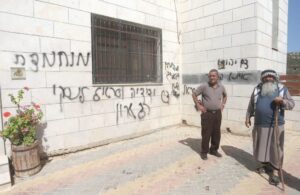I was brutalized by Israeli soldiers in the West Bank. It was only a fraction of what Palestinians experience every day.

Palestinians inspect a burned-out mosque in the village of Aqraba, south of Nablus, after Israeli settlers set fire to the entrance and spray-painted Hebrew graffiti on the walls
An anonymous contributor writes in Mondoweiss on 7 September 2025:
In mid-August, I, along with another international activist, was beaten and robbed by armed Israeli soldiers in the rural village of Ibziq. The assault gave us only a faint, yet utterly incommensurate, glimpse of the imminent danger that Palestinians experience every day.
We were stationed in the area as part of a protective presence team affiliated with the International Solidarity Movement (ISM). ISM’s work involves taking direct action to document and deter attacks, demolitions, and settler raids on Palestinian communities across the West Bank.
At around 8 p.m. that night, at least eight Israeli soldiers in dune-buggy-style military vehicles invaded Ibziq. They wore army helmets, balaclavas, body armor, full combat uniforms, and had laser-sighted assault rifles slung across their chests.
For over an hour, reservists patrolled, trespassed onto school grounds, tampered with waterlines, blocked entry roads, and threatened to raze the village. Such intrusions are frequent. Eventually, they forced their way into a Palestinian family’s home.
I and my ISM partner immediately approached with our hands raised to show we were unarmed. We asserted that the soldiers were illegally encroaching on Palestinian land and that their threats contravened international law. The response was swift and brutal.
My partner was dragged to the ground, punched, and had sand kicked into their eyes and mouth. When I tried to intervene and film, multiple soldiers chambered live rounds and trained their rifles on me.
Laser dots traced my head, chest, and stomach before finally settling steadily on my groin. This type of targeting and attempted genital mutilation has become a widespread practice amongst the Israeli military.
I was forced to my knees at gunpoint and told I would be shot if I did not comply. After being shoved to my stomach, two officers wrenched my arm behind my back, stole my phone, and elbowed me in the back of my head.
When staring down the barrel of a gun, the choice I made as a professor — inspired by the courage of the student encampments to do something beyond writing critically and teaching about decolonization in the relatively safe confines of a complicit UK university — suddenly became startlingly real.
When leaving, the soldiers shouted at Palestinians that Ibziq would be set ablaze. “They threatened to burn us alive,” one family member recalled. I and the other volunteer were taken by a Red Crescent ambulance and treated in the hospital.
In principle, protective presence is straightforward. ISM volunteers literally walk alongside Palestinians who are under threat and record human rights violations. We also try — if only briefly — to interrupt the violence of colonial occupation. Protective presence is an admittedly limited but tangible and personal way to practice international solidarity without saviorism. Markedly, it does the necessary relational work of letting Palestinians know they are not alone.
Notably, while international volunteers face real risks and occasionally pay with our lives, Palestinians endure ruthless violence and terror at the hands of the Zionist movement on a day-to-day basis — with far greater cruelty and far higher costs.
